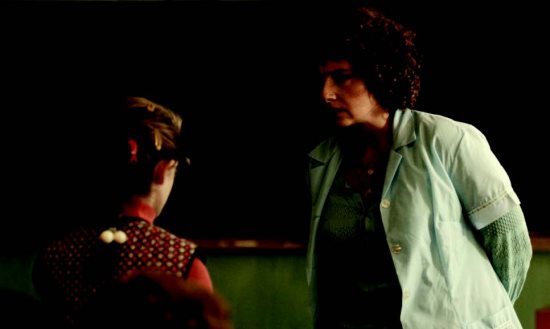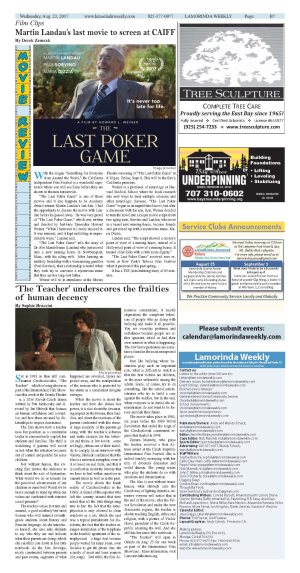| | Published August 23rd, 2017
| 'The Teacher' underscores the frailties of human decency
| | | By Sophie Braccini |  | | Photo provided |
Set in 1983 in then still communist Czechoslovakia, "The Teacher" - which is being shown as part of the International Film Showcase this week at the Orinda Theatre - is a 2016 Slovak-Czech drama written by Petr Jarchovsky and directed by Jan Hrebejk that focuses on human selfishness and cowardice, and how these are used by dictatorships to impose dominance.
 The film shows how a teacher uses her position as a communist leader to remorselessly exploit her students and families. The thrill is wondering if parents will revolt or not when the situation becomes out of control and painful for some children.
The film shows how a teacher uses her position as a communist leader to remorselessly exploit her students and families. The thrill is wondering if parents will revolt or not when the situation becomes out of control and painful for some children.
 Not without humor, this riveting film invites the audience to think about the role of bystanders. What would we do or tolerate for the perceived advancement of our children or ourselves? Would we be brave enough to stand up when our values are confronted with extreme social pressure?
Not without humor, this riveting film invites the audience to think about the role of bystanders. What would we do or tolerate for the perceived advancement of our children or ourselves? Would we be brave enough to stand up when our values are confronted with extreme social pressure?
 The teacher comes in warm and assured, a good motherly but strict woman who will instruct seventh-grade students about history and Russian language. As she introduces herself, she also asks students to say who they are and indicate what their parents are doing, which she carefully jots down in her little notebook. As the film develops, nicely constructed between present and past events, segments of what happened are revealed, layers are pealed away, and the manipulation of the woman who is protected by her status as a communist delegate emerges.
The teacher comes in warm and assured, a good motherly but strict woman who will instruct seventh-grade students about history and Russian language. As she introduces herself, she also asks students to say who they are and indicate what their parents are doing, which she carefully jots down in her little notebook. As the film develops, nicely constructed between present and past events, segments of what happened are revealed, layers are pealed away, and the manipulation of the woman who is protected by her status as a communist delegate emerges.
 While the movie is about the teacher and how she abuses her power, it is also about the devastating impact on the tweens, their families, and about the reactions of the parents confronted with this abuse. A large majority of the parents go along with the teacher's schemes and make excuses for her behavior and theirs. A few revolt - some willingly, others out of their inability to comply. In an interview with Variety, Hrebejk confirmed that the film is a universal metaphor, even if it is based on real facts, and that it is a reflection about the bravery that we have to find within ourselves in current times as well as in the past.
While the movie is about the teacher and how she abuses her power, it is also about the devastating impact on the tweens, their families, and about the reactions of the parents confronted with this abuse. A large majority of the parents go along with the teacher's schemes and make excuses for her behavior and theirs. A few revolt - some willingly, others out of their inability to comply. In an interview with Variety, Hrebejk confirmed that the film is a universal metaphor, even if it is based on real facts, and that it is a reflection about the bravery that we have to find within ourselves in current times as well as in the past.
 The movie shows the harsh reality of Czechoslovakia in the 1980s. A friend of this reporter who left the country around that time noted that all the little things rang true to her: the fact that the astrophysicist is only allowed to clean windows as a job, which she said was a typical punishment for dissidents; the fact that the teacher arranges installation of the telephone in the horrible apartment of the astrophysicist - a huge deal because people waited for many years, even decades to get the phone line; the scarcity of meat and bone marrow (for soup). But while the film denounces communism, it mostly stigmatizes the compliant behaviors of people who go along with bullying and make it all possible. You see everyday pettiness and selfishness because people are either ignorant, afraid or find their own interest in what is happening. The few brave protesters are sometimes found in the most unexpected places.
The movie shows the harsh reality of Czechoslovakia in the 1980s. A friend of this reporter who left the country around that time noted that all the little things rang true to her: the fact that the astrophysicist is only allowed to clean windows as a job, which she said was a typical punishment for dissidents; the fact that the teacher arranges installation of the telephone in the horrible apartment of the astrophysicist - a huge deal because people waited for many years, even decades to get the phone line; the scarcity of meat and bone marrow (for soup). But while the film denounces communism, it mostly stigmatizes the compliant behaviors of people who go along with bullying and make it all possible. You see everyday pettiness and selfishness because people are either ignorant, afraid or find their own interest in what is happening. The few brave protesters are sometimes found in the most unexpected places.
 Just like bullying where bystanders play such an important role, what is difficult to watch is that the first victims are children, or the more vulnerable among the adults. Some, of course, try to do something, like the school administrators who try to build a case against the teacher, but in the end, when everyone is in denial, the administrators do not want to be heroes and risk their future.
Just like bullying where bystanders play such an important role, what is difficult to watch is that the first victims are children, or the more vulnerable among the adults. Some, of course, try to do something, like the school administrators who try to build a case against the teacher, but in the end, when everyone is in denial, the administrators do not want to be heroes and risk their future.
 The movie takes place in 1983, six years before the 1989 Velvet Revolution that ended the reign of the Czechoslovak communist regime that started in 1948.
The movie takes place in 1983, six years before the 1989 Velvet Revolution that ended the reign of the Czechoslovak communist regime that started in 1948.
 Zuzana Mauréry, who plays the teacher, received a Best Actress award at the Czech Republic International Film Festival. She is indeed terribly menacing with her mix of debonair demeanor and veiled threats. The young actors who play the students do so with emotions and determination.
Zuzana Mauréry, who plays the teacher, received a Best Actress award at the Czech Republic International Film Festival. She is indeed terribly menacing with her mix of debonair demeanor and veiled threats. The young actors who play the students do so with emotions and determination.
 The film is not without ironic humor, what Hrebejk calls the Czech way of fighting injustice. Attentive viewers will notice that at the end of the movie, after the Velvet Revolution and under the new democratic regime, the teacher is shown teaching English, ethics and religion, with a picture of Vàclav Havel, president of the Czech Republic adorning the wall. And she still has her same little notebook.
The film is not without ironic humor, what Hrebejk calls the Czech way of fighting injustice. Attentive viewers will notice that at the end of the movie, after the Velvet Revolution and under the new democratic regime, the teacher is shown teaching English, ethics and religion, with a picture of Vàclav Havel, president of the Czech Republic adorning the wall. And she still has her same little notebook.
 "The Teacher" will open in Orinda on Aug. 25 for one week as part of the International Film Showcase. More information, visit www.Lamorindatheatres.org.
"The Teacher" will open in Orinda on Aug. 25 for one week as part of the International Film Showcase. More information, visit www.Lamorindatheatres.org.


|
| | | | | | | | | | | | |



